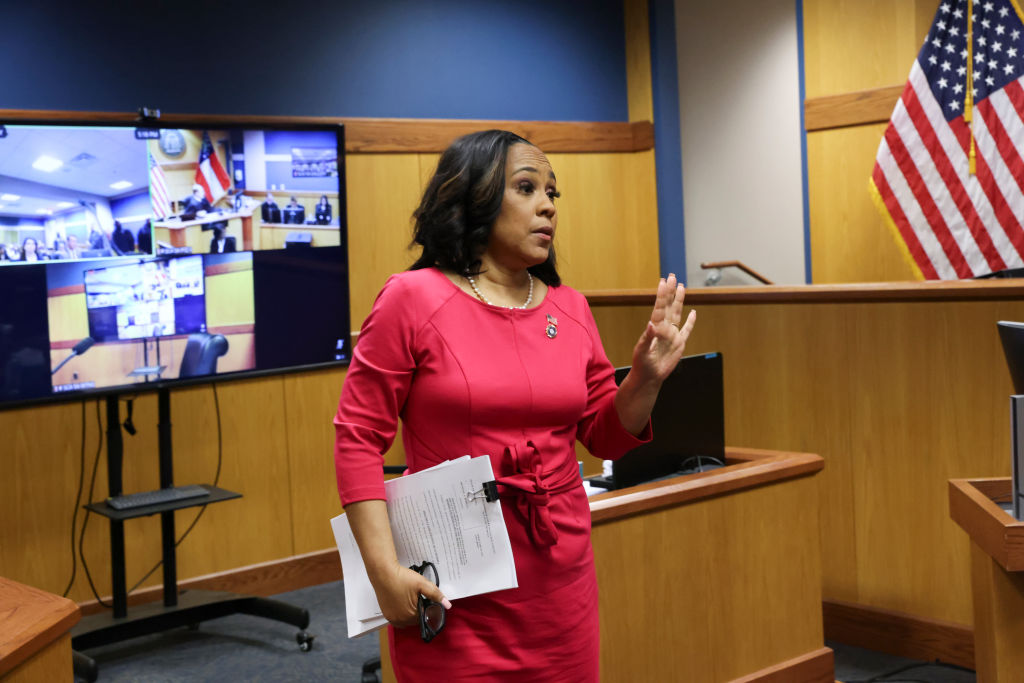Fani Willis, the district attorney for Fulton County, Georgia, went down in flames on Thursday. A crematorium wouldn’t have been more efficient. Her angry, self-righteous defense added a load of fossil fuel to the conflagration.
It happened at a judicial hearing before Judge Scott McAfee, who is presiding over the election-interference case Willis brought against Donald Trump and eighteen codefendants. The district attorney charged them with acting jointly to overturn the 2020 US presidential election. Her basic allegation is that they conspired to add bogus votes to Trump’s total so they could flip the state’s electoral vote. Then, a slate of false electors, pledged to Trump, would certify he had won the state.
Willis bundled these allegations and charged the entire group, many of whom had never met, with violating the Racketeer Influenced and Corrupt Organizations Act. The defendants counter-sued to remove Willis and her office from the case. Their biggest goal is to have the entire case dismissed.
Trump and his codefendants assert that
- The ‘specialist’ Fani Willis hired to lead the prosecution had no qualifications for such a complex, difficult case and that Willis really hired Nathan Wade because he was her boyfriend;
- DA Willis then paid her friend Wade more than $650,000 so far; two other specialists were also hired, one a RICO expert; those two, together, have received less than $100,000;
- Willis benefited financially from hiring Wade since the two took some seven vacations together in the US and abroad; all the expenses were charged to Wade’s credit card; the allegation is that he could pay for these excursions only because her office had paid him so generously;
- Both Wade and Willis made false declarations to courts, denying they had a romantic, sexual relationship, denying she had hired him before that relationship began, and denying she received any benefits from Wade or others
Those incendiary charges were the topic of Thursday’s hearing. Judge McAfee said he would deal separately with another serious allegation: that Willis had influenced a potential Atlanta jury with her inflammatory speech to a local black congregation. Yet another charge — this one a felony — was only hinted at. Did Willis or her office leak grand jury proceedings to journalists?
When Willis took the stand Thursday, her response was ferocious. In long, filibustering answers, she not only rejected all allegations, she smeared the defense counsel, saying the questions were really trying to undermine democracy. (Wade, who testified before her, was much calmer. When he finished, Willis stormed into the courtroom, surprising everyone. She never calmed down.)
Willis said that Wade was merely her friend when she hired him. Their romantic relationship only began a couple of months later. Second, she never benefited financially from their relationship. Although they had taken multiple vacations together, she had always covered her half of the costs. When asked if she had any proof that she had made those payments, she declared she had always paid Wade in cash. Her word was all the proof she needed, she said.
What about the forms state employees such as Willis are required to submit concerning any outside benefits? She hadn’t submitted any, she said, because she always paid her own way. Again, she always paid in cash. Like any district attorney who wanted to avoid the appearance of impropriety.
Naturally, defense attorneys asked Willis where all this cash came from. She kept it at home, she said, but offered no explanation for the source of this horde. That’s a puzzler since she receives her salary as an electronic payment and has no record of withdrawing cash from an ATM or other source. Nathan Wade has no records of receiving or depositing any cash from her.
The question of hypocrisy also lingers over the affair. When Willis was running for office, she assured a television interviewer she would never have sex with anyone who worked “under her.” (That might not have been the best phrase.) Her current explanation is that Wade didn’t work under her. He was simply a contractor she hired.
Fani’s bad day didn’t start with her testimony or even Wade’s. It began earlier, with testimony from Robin Yeartie, Fani’s friend of thirty years (now a former friend), who later worked in the DA’s office. Testifying under oath, Yeartie says she saw Willis and Wade give clear evidence of their romantic relationship before November 2021. That’s important, if true, because that’s before the two say their affair began and before Willis hired her friend.
As DA, Willis has full authority to hire outside attorneys and pay them generously. The problem arises only if she received personal (corrupt) benefits from her decision. That’s what makes Thursday’s testimony such a problem for Willis, regardless of when she began the affair. After Wade began work for her, the two went on expensive trips together and cannot prove they split the costs. The question whether Willis acted corruptly is underscored by her decision to hire an attorney who spent his career dealing with small cases.
Most of the damaging information that came out Thursday stems from a nasty, ongoing divorce case between Nathan Wade and his wife of twenty-six years, Joycelyn. When Nathan began his romantic relationship with Fani Willis, he was separated but still married. That’s how Joycelyn managed to get hold of the credit card statements showing the expenses for Nathan and Fani’s jaunts together. Joycelyn has said she was nearly penniless while Nathan was spending lavishly and hiding their joint income.
Last week, just before the divorce court was scheduled to hear the husband’s explanation and possibly his mistress’s, Nathan reached a financial settlement with Joycelyn. Still, he paid a high price for the delay, beyond any financial costs.
First, in the divorce proceedings, Nathan swore that he had not had any outside relationship during the marriage and had not spent money on such relationships. Oops. When it became clear that these declarations would be scrutinized in the RICO courtroom, Nathan amended his sworn statements, first in December 2023 and then again in January 2024. Instead of admitting anything, however, his amended response was a refusal to answer. (The effect was the same as the Fifth Amendment, though Wade used a different Georgia law.)
The other cost was the entanglement of the extramarital affair with the RICO case, thanks to a very competent attorney, Ashleigh Merchant, who is representing Mike Roman. Merchant and Roman hope to remove Willis and her office from the prosecution, which would delay the case for months, perhaps years, as it was handed to a new prosecution team from another Georgia county. The new team might decide not to prosecute, if Judge McAfee hadn’t already ended the case.
The district attorney has yet another problem — and it’s a serious one. If she made false statements under oath or funneled public money to a boyfriend and then benefited from it, Willis could face discipline, disbarment or even criminal charges.
What about a presidential pardon to end the case if Trump is elected? It can’t happen. Presidents can only pardon for federal offenses, and this case isn’t one. It is being brought under Georgia law. The governor, a Republican, can’t do anything either. Unlike most states, Georgia only permits pardons after a convicted felon has served five years. The state legislature is under pressure to change that law.
The evidentiary hearing will continue in Judge McAfee’s court, but the case against Willis is building. The appearance of corruption and impropriety is obvious. That won’t necessarily end the case, but it is more than enough to end Fani Willis’s participation in it.
She tried to incinerate Trump and tumbled into the inferno.


























Leave a Reply